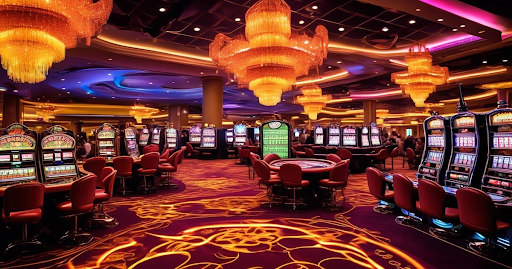
Casino games have fascinated players throughout history, transforming from easy diversions to complex experiences that combine luck, tactics, and entertainment. From the ancient roots of gambling in societies including the ancient societies of Mesopotamia and Rome to the extravagant corridors of modern casinos, the history of these games uncovers much about human nature and our interaction with chance. As cultures blended and technological advancements have occurred, casino games have changed, illustrating the changes in society and developments in gameplay.
The initial iterations of gambling likely featured simple dice games and placing bets on the outcomes of sports competitions. As time passed, these primitive activities grew into more structured games like card games, the game of roulette, and the multitude one-armed bandits that fill casino floors today. Every generation brought its distinct regulations, design elements, and sociocultural significance. At present, casino games continue to evolve with the rise of online platforms, enabling players from various parts of the world to participate in a collective experience, further blending the traditional with the digital age.
Early Origins of Casino Activities
Gambling activities have roots that stretch back to old societies, where betting was deeply integrated in social practices and cultural rituals. The initial known instances of betting appeared in ancient Mesopotamia around three thousand BC, involving basic die games made from knuckle material. These early games laid the foundation for more complex gambling activities, showing human beings’ innate urge to pursue fortune and entertainment through luck.
As civilizations developed, so did their betting pursuits. In early China, around 2300 BC, tiles were found that were similar to early rudimentary forms of a lottery game activity. More structured forms of betting arose in the Roman Empire, where games of luck were a frequent pastime, often taking place in community events. The ancient Romans developed multiple wagering games, which included dice and table games, illustrating the widespread nature of betting across different economic classes.
With the flow of years, these early activities contributed to the progress of contemporary casino activities. In the medieval period, playing card games became prevalent in Europe, paving the way for the professional gaming establishments we know today. The shift from informal betting to formal gambling in taverns and private houses marked a significant shift in how people interacted with games of chance, leading to the eventual establishment of gaming houses as dedicated places for gambling.
The Emergence of Contemporary Casino Gaming
The final 1960s and 1970s marked a significant transition in the world of casino games, fueled by technological progress and shifts in societal views towards wagering. The introduction of computers and the internet transformed the way players engaged with their favorite casino games. Online casinos emerged, allowing enthusiasts to enjoy classic table games like poker and 21 from the safety of their houses. This emerging online environment not only expanded availability to casino games but also attracted a fresh crowd who found the ease and variety appealing.
As digital gambling gained momentum, so did advancements in gaming technology. The creation of sophisticated software and visual elements transformed conventional gambling games into engaging experiences. Players could now connect with realistic dealers through live streaming, bringing the atmosphere of physical casinos directly into their houses. This fusion of in-person play with digital interfaces created a unique hybrid experience that boosted the social aspect of gambling, making it possible for individuals to connect and compete with others around the world.
Furthermore, the emergence of gaming on mobile devices substantially changed the casino landscape. With the ubiquitous use of smartphones and touch devices, gamblers can access their favorite casino games at any location, anytime. Mobile applications offer a vast array of options customized for touchscreens, serving the fast-paced daily life of modern users. goksites zonder cruks This accessibility has produced increased participation in gambling, fostering the exponential growth of the gambling sector. As a result, the prospects of gambling continues to evolve, responding to new technologies and changing player expectations.
The Impact of Technology on Casino Games
The evolution of technology has greatly changed casino games, enhancing the overall gaming experience for gamblers globally. As the internet emerged, online casinos were created, allowing players to play their preferred games from the comfort of their homes. This shift not only made casino games more accessible but also expanded the variety of games available, as online platforms could offer many different versions of traditional games without the limitations of physical casinos.
The rise of mobile technology further revolutionized the casino gaming landscape. With the proliferation, players can to engage in casino games anytime and anywhere. This mobility has resulted in the creation of dedicated mobile applications and optimized websites that offer smooth gaming experiences. Additionally, advancements such as live dealer games have delivered the genuine feel of a casino into players’ living rooms, connecting between physical and online gaming.
Moreover, advancements in artificial intelligence and VR are paving the way for the next generation of casino games. AI improves game design and player interaction, creating customized experiences based on user behavior and preferences. Meanwhile, virtual reality provides immersive environments where players can engage in a virtual casino environment, making the gaming experience more engaging and realistic. As technology continues to evolve, the future of casino games looks promising, filled with limitless opportunities for innovation and entertainment.